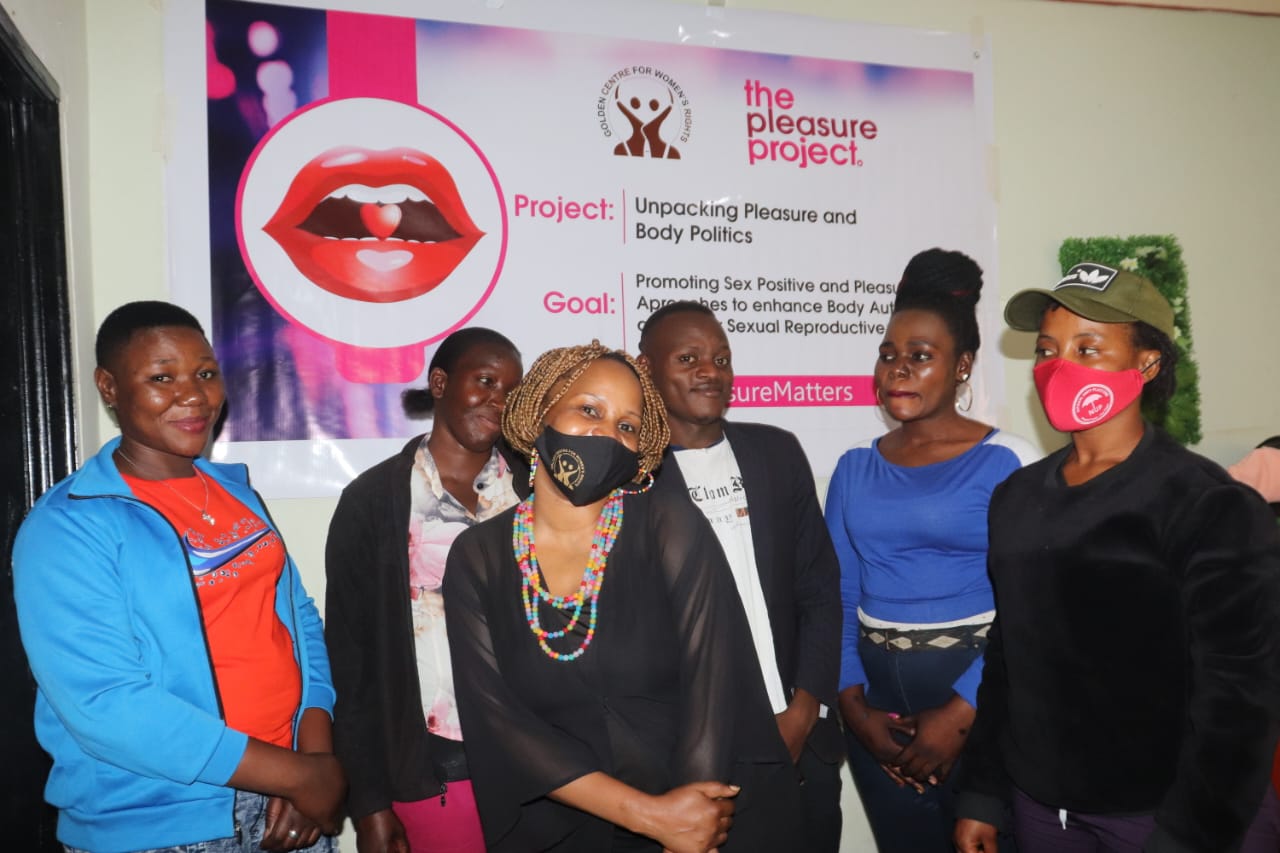Shira Natenda, a feminist, writer, sex worker rights activist, a women human rights defender and SRHR Champion with a bachelor's in Guidance and Counselling. Shira has verst experience in Gender Justice, Sexual Reproductive Health and Feminist Transformational leadership.
 Pleasure training of trainers
Pleasure training of trainers 

Shira Natenda, a feminist, writer, sex worker rights activist, a women human rights defender and SRHR Champion with a bachelor's in Guidance and Counselling. Shira has verst experience in Gender Justice, Sexual Reproductive Health and Feminist Transformational leadership. She is Currently the Executive Director of Golden Centre for Women’s Rights Uganda a group for and by women migrant/refugee and native sex workers. Shira believes in sexual freedom for everyone. She joined the Pleasure Project to deepen her understanding and enhance her Pleasure Advocacy skills in order to serve the community better. She hopes to train and mentor more pleasure advocates once the training is completed.
During the Pleasure Fellowship, Shira worked to enhance the understanding of pleasure among sex workers in Uganda, by organizing a 3 day Pleasure Training of Trainers. These trained sexuality educators will support in sensitizing communities, developing and maintaining confidence and feeling comfortable to discuss sex and sexuality more openly – mobilizing and organizing safe spaces to discuss pleasure and sex positive narratives. At the same time, Shira developed, printed and disseminated pleasure material representing the context of her country from a feminist perspective. Shira remains engaged in different ways with The Pleasure Project, including being part of the Community of Practice of organizations endorsing The Pleasure Principles, with her organization the Golden Centre for Women’s Rights Uganda.
Recently, Shira participated as a member of the Condom Think Tank – a project developed by Safe Hands, an endorsing organization of The Pleasure Principles by The Pleasure Project. Additionally, Shira has worked facilitating training sessions on pleasure to Amplify Change.
 Highlights
Highlights
In Uganda, pleasure is invisible and talking about sex remains a taboo
Sex is still associated with sin, diseases, death and immorality. When it comes to sex, men believe women are to serve their sexual desires at a cost of their own and women are upholding these sexual power dynamics. Keeping condoms can be humiliating and it can be used as an exhibit for prostitution charges, same sex relationships which are illegal or a sign of an STI or unfaithfulness. Only marital and heterosexual sex is what is considered righteous sex. On the other hand, sex work is legally, socially and religiously unacceptable in Uganda. It is important to note that gender roles and norms play a key role in sexual behavior, since it’s often assumed that men should dominate women sexually. This assumption leads to a loss of body autonomy and the ability to control sexual behavior among women, as well as a way to increase sexual risks such as not using an internal condom, family planning or failure to negotiate safe and pleasurable sex. Furthermore, keeping silent about sex and sexual pleasure fuels sexual stigma, sexual trauma, psychologically induced sexual dysfunction and shuns young people and women from accessing SRHR services and information. Thus, there is a need to adopt a pleasure-based approach that broadens the understanding of safe and pleasurable sex and dismantles harmful sexual conservatism. Thus, empowering women, girls, men and boys to achieve comprehensive SRHR. The project proposes to challenge the silence, shame, sexual hierarchy and harmful sexual conservatism around pleasure through the empowerment of sex workerd and mainstream Ugandan women through training sessions and pleasure-based materials.
"This was a great experience and opportunity to network. Pleasure work is so lonely but I got to talk about sexual pleasure freely with the other fellows.. I also realized that there is a whole organization advocating for pleasure which is powerful. The fellowship broadened my understanding and skills in pleasure advocacy as well as boosted my confidence in wider SRHR work”.